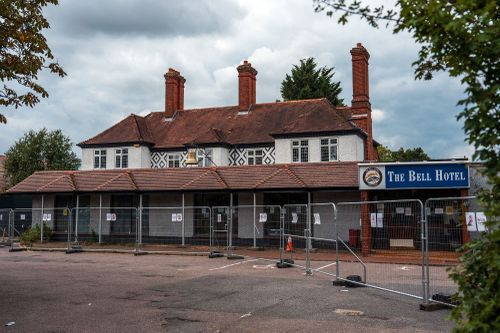Share this @internewscast.com
The Bell Hotel in Epping, located just outside of London, receives no new bookings yet remains fully occupied every night. This is because, since 2020, it has been used by the government to accommodate thousands of asylum seekers arriving each year on England’s southern coast, who subsequently find themselves caught in bureaucratic uncertainty.
Apart from the hoteliers, the current system satisfies no one: Neither the government and local councils, who bear the financial burden of hefty contracts; nor the asylum seekers, who may spend years residing in a small room awaiting a decision on whether they can remain in Britain; and, more recently in the case of the Epping hotel, not the local residents, some of whom express feelings of insecurity with groups of young men residing in the area.
Occasionally, these grievances escalate. In Epping, tensions heightened last month after an asylum seeker from Ethiopia was charged with sexually assaulting a schoolgirl on the local high street. He faces additional charges and is awaiting trial, denying all allegations.

Many residents were incensed. Some held protests outside the hotel â fuelled by those on the hard-right â which turned violent.
Protesters found reason to celebrate on Tuesday, when the council secured a landmark High Court ruling blocking the Bell Hotel’s owners from accommodating asylum seekers, following the council’s complaint that the hotel was not fulfilling its intended function. The 138 residents will need to vacate the premises next month.
This court decision has thrust the three-star hotel into the midst of a political controversy, potentially causing significant trouble for the Labour government. The question of where these asylum seekers will be relocated next presents a formidable challenge for Prime Minister Keir Starmer.
But for Nigel Farage, the firebrand leader of the hard-right Reform UK party, the ruling was a cause for celebration.
Farage, who once spearheaded Britain’s Brexit campaign and now serves as a member of parliament, praised the ruling as a “great victory.” He urged for similar demonstrations outside migrant hotels nationwide, encouraging local councils to pursue legal action to prevent other hotels from accommodating asylum seekers. Protests are anticipated across Britain this weekend.
If councils across the UK choose to take similar legal action, that could create a major problem for the government, which has a legal obligation to provide accommodation for asylum seekers while their claims are being processed. In the UK, some 210 hotels are being used to house about 32,000 people. If other councils win rulings like Epping, the government could within months have to find other places to house them while their claims crawl through the system.
Mohamed Khador said it took him three years to make it from Somalia to the UK. The longest time the 24-year-old spent anywhere was in Austria, where he worked briefly as a dish washer, but mostly he was always on the move. When he arrived in Dunkirk, northern France, he had saved about $US1000 ($1500). That was enough to buy him a space on a derelict dinghy, with some 70 others, hoping soon to see England’s white cliffs. The journey across the Channel was “scary, painful, cold,” Khador told CNN.
When he arrived four months ago, he was taken to a processing centre. Since then, he has lived at the Bell Hotel, unable to work legally â asylum seekers were stripped of the right to work in 2002 as part of the British government’s attempts to deter illegal immigration.

At first, things were “normal”, he said. While the locals would play cricket, he would play soccer with others staying in the hotel. “We’d go out. Nobody cared,” he said.
Then came what he calls “the incident”, which seemed to have become a touchstone in the town’s collective mind.
In July, Hadush Kebatu, a 38-year-old from Ethiopia, was charged with sexual assault, harassment, and inciting a girl to engage in sexual activity. She was 14.
Eddie and Elaine, a couple who have lived in the area for 15 years and declined to give their last names, said the past few weeks have been a turning point, after years of relative calm.
“This summer is the worst it’s been, with the problems,” Elaine told CNN. “No one, really, thinks it’s a good idea to have 150 men in a place like that, on the corner of a town, right next to the school.”
The day after the court ruling, many in the town made their feelings known. Dozens of people drove past the Bell Hotel, honking their horns in seeming celebration. Others called out “Get Starmer gone” and, “About time, get rid of ’em”. There were several loud chants of “Niiigel”, in support of Farage, one of a select number of British politicians whom the public feel they know on a first-name basis.
For Khador, “the incident” also changed everything. He said people have thrown beer cans at him while he walks to the local shop; others shout “scum” as they drive by.

“They say you are innocent until proven guilty. It’s like the opposite of that now. It’s like you are guilty until proven innocent. At the moment, you’re just an immigrant. You’re guilty.”
The road that runs from the town centre to the Bell Hotel has, in the past two weeks, been lined with the white and red of the England St George’s Cross flag.
“I think it’s great,” said one passerby. “These are our streets.”
But others were quietly troubled by the displays of nationalism, which some feared could have an ugly edge. One man said he did not want to be quoted because, if he expressed support for migrants, he feared he might become a target for the protesters who had on recent nights demonstrated outside the hotel.
“It’s a small town. People talk. Everyone knows where everyone lives,” he said.
Although Farage has called for “peaceful” demonstrations across the UK, recent protests have not always been peaceful.
Last summer, the UK saw protests devolve into thuggish violence and outright racism when misinformation helped fuel anti-immigration riots across the country. The killing of three girls in Southport, northern England, at a Taylor Swift-themed yoga class last July led to widespread unrest, with dozens arrested. In one instance, protesters set fire to a hotel used to house asylum seekers while people were still inside.

Far-right activists were accused of using social media platforms to spread disinformation, most notably falsely claiming that the Southport attacker was an immigrant who had arrived in the UK illegally. In reality, the man convicted of the murders was a teenager born in the Welsh capital Cardiff to Rwandan migrants.
Since the Labour party came to power last summer, about 38,000 people have arrived on small boats; down from a peak in 2022, but still more than a third up on the previous year. Many of those have been housed in hotels.
Recent policies, such as a “one-in-one-out” deal with France, cannot solve the central problem: Thousands of people each year are still willing to risk their lives to travel across the Channel.
Frustration with high levels of immigration, coupled with discontent over Britain’s sluggish economic growth, has provided fertile ground for nativism.
“We’re a small country,” said Eddie. “We can only absorb so much before it changes our whole environment. But we, actually, were brought up here â by our parents, after World War II.”
Asked where he thinks those staying in the Bell Hotel should be removed to, he said: “We think there should be probably purpose-made camps. They’ve had years to think this out ⦠They should be building some camps to absorb the influx and deal with them.”

The Home Office announced on Friday it will appeal the court’s ruling, saying the government is committed to closing all asylum hotels by 2029, but that it wants this to be done in a “managed and orderly manner”. Earlier, it had warned that the court’s decision would “substantially impact” its ability to house asylum seekers in hotels across the UK.
Those impacts are likely to grow larger still, as other councils weigh whether to lodge their own legal challenges. Farage said the 10 councils run by Reform UK will do “everything in their power” to win similar rulings. Even some Labour councils have announced similar plans.
At the Bell Hotel, all 80 rooms housing 138 people will need to be emptied by the evening of September 12.
For Khador, the Somali man, this likely means many more months before he can, as he sees it, restart his life.
“I just want to prove that I’m not a criminal. Just prove that I can contribute. I’m not a freeloader,” he said.
But whether he’s in another hotel or a different type of accommodation altogether makes little difference. “It’s going to be the same in every place,” he said.













